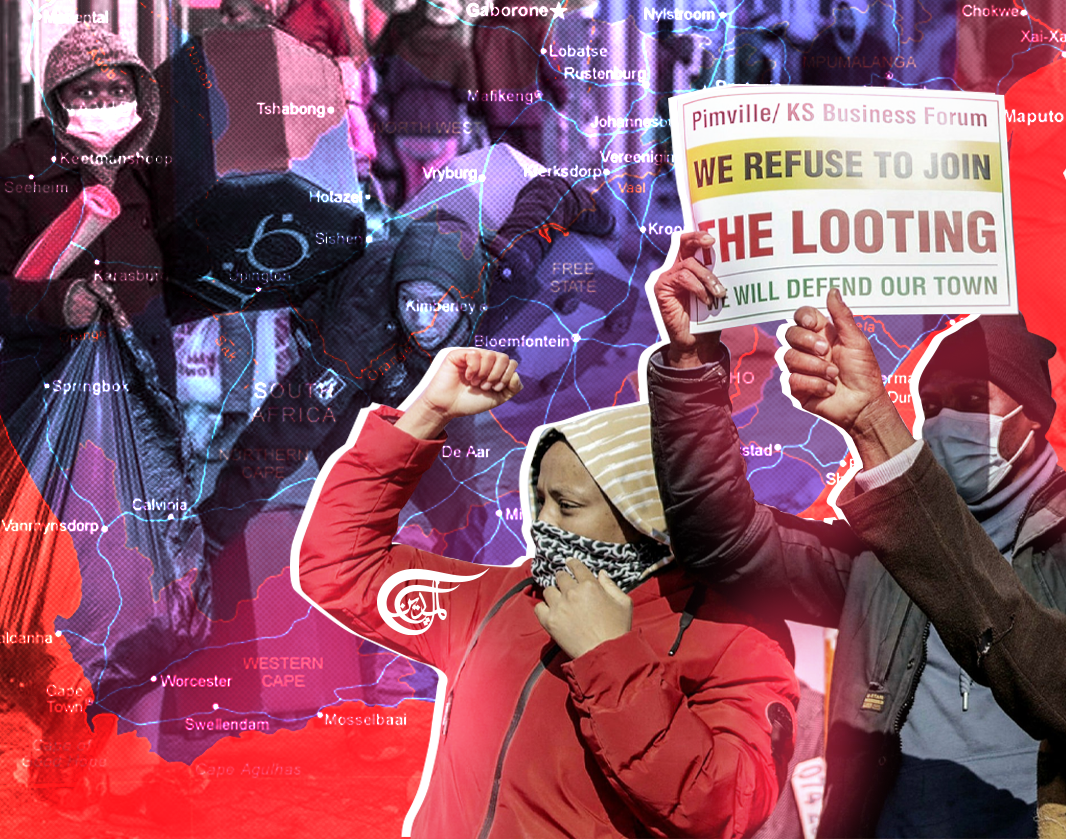Riots and Social Explosion in South Africa
After decades of governmental abuse and neglect of the most disadvantaged classes in a country of 60 million people, almost half of the population lives in poverty.
-

Riots and Social Explosion in South Africa
Over the last week, two of South Africa's nine provinces have faced serious street riots, KwaZulu-Natal and Gauteng, resulting in more than 90 deaths from violence, two of them are 15 and 14-year-old, and more than 1,600 people arrested.
On July 15, the media reported a marked decrease in violent incidents, due to the deployment and coordinated action of all state security agencies. The Metropolitan Police, the numerous private security companies, and the South African Police Service (SAPS) have been joined by almost 10,000 military personnel.
Various political agendas
On July 7, former South African President Jacob Zuma was sentenced to 15 months in prison for contempt of court. He didn’t appear for his corruption trial for 9 years since he took office (2009 - 2018), and insisted that his trial is politically motivated.
The imprisonment of this controversial figure sparked sporadic riots on Thursday 8 and Friday 9, encouraged by some ANC figures and staged by his supporters. But the reality is that the majority of the South African population is preoccupied with other more important things, such as their survival. They consider Zuma, like the rest of the ruling party's top officials, political gangsters who belong in jail.
Very conveniently, in the midst of this unrest, Prime Minister Cyril Ramaphosa appeared before the nation on Sunday to announce the extension of strict confinement measures and some other draconian procedures that will make those bearing the brunt of the pandemic even worse off. It was this announcement, which made no mention of the harsh living conditions of the poorest people that sparked the violent mass protests in the country's two most populous provinces. The riot led by Zuma's supporters has only been a match that has fallen on a powder keg.
The government blamed Zuma's supporters for chaos, not the mismanagement of the pandemic and the poverty of much of the country. The Zuma-supporting section of the ANC claims that this is all because of the massive public support for the former president. But the reality is that both sides are trying to instrumentalize the anger of a population that has been subjected to appalling living conditions for many decades.
The shack dwellers' movement, Abahlali baseMjondolo, claims in a statement that according to its sources, ordinary, hungry people have come out for food and necessities they cannot afford, while Zuma's supporters are burning factories, warehouses and destroying infrastructure.
The Abahlali baseMjondolo movement has long warned of the risk of a social explosion. After decades of governmental abuse and neglect of the most disadvantaged classes in a country of 60 million people, almost half of the population lives in poverty, a figure that has increased by an additional one million people during the pandemic. According to them, more than 42% of the adult population is unemployed and youth unemployment is 74%. It is one of the most socio-economically unequal countries, not in Africa, but in the world.
Since March last year, the hunger situation of many households has worsened. Many people have lost their jobs or livelihoods because of restrictions, many students have dropped out of school, and the last straw was the announcement on Sunday of the extension of severe restrictions to cope with the third wave of Covid-19. But the president made no mention of the already desperate situation of large sections of the population, nor of resuming the small measure of assistance that had been suspended a few months ago. On April 30, the government announced the withdrawal of the Special COVID-19 Social Relief of Distress, some R350 a month, which a few had managed to collect for a few months.
Citizens who count and citizens who don't
The editors of three influential liberal newspapers, The City Press, News 24, and The Witness, have published a strongly worded letter to President Ramaphosa, demanding that he declares a state of emergency and crackdown more vigorously on those responsible for the riots, adding that "This is the greatest test of your presidency and so far you have failed spectacularly to honor the oath you took to protect the law-abiding citizens of this country". This lens ignores the desperate social situation of millions of people.
The acting Minister of the Presidency, Khumbudzo Ntshavheni, seems to have the same short-sighted vision when she states that "We are not at liberty to announce who is behind it, because if we do, that will jeopardize the investigation and successful prosecution of all the cases" if poverty is the main cause of the magnitude of the violence, who should be prosecuted?
Since the beginning of the pandemic, there has been another kind of looting that no one is talking about: government officials have looted the funds received to counter Covid-19, as investigations into ineffective state management are revealing. It is very good to advertise in the media to wash your hands thoroughly to avoid contagion, but the half of the population that has no sanitary facilities at home, nor clean water, needs another type of management...
Victims will be the usual victims
The mayor of Durban speaks directly of "racial tensions". In the port city of Durban with a population of 3.2 million, some 55 000 informal vendors, some 40 000 formal small businesses, will never be able to recover, and an estimated 129 000 jobs in Durban, not to mention the economic damage, have been affected by the last week's destruction.
At a time when street violence seems to be under control, the concerns are different: The situation of poverty that has been dragging on since apartheid times, worsened by the pandemic, now increased by all this loss of livelihoods, such as businesses and jobs. The repressive violence of the state urged brutal security forces to open fire on peaceful demonstrators, as happened in the 2012 strike at the Marikana mine; the foreseeable shortages of food and other basic necessities, medicines, and fuel; the rising cost of basic goods, already unaffordable for a large part of the population...
The main victims of this violent explosion of indignation and frustration will be the local people, the poorest, and the rioters themselves, who will be criminalized by the State, the media, and the "right-thinking" society.
The Abahlali baseMjondolo movement laments in its communique that "Ungovernability will leave us poorer and more divided".

 Rosa Moro
Rosa Moro
 6 Min Read
6 Min Read











